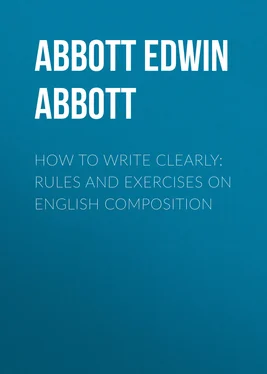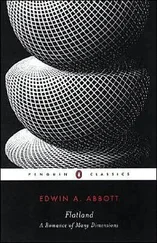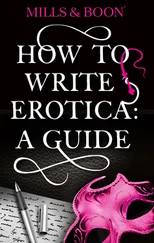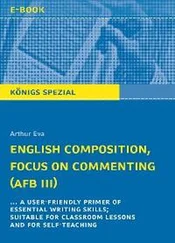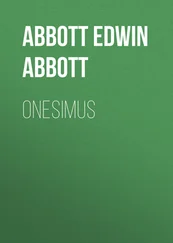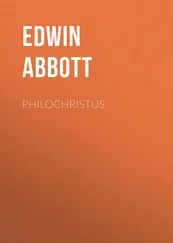Edwin Abbott - How to Write Clearly - Rules and Exercises on English Composition
Здесь есть возможность читать онлайн «Edwin Abbott - How to Write Clearly - Rules and Exercises on English Composition» — ознакомительный отрывок электронной книги совершенно бесплатно, а после прочтения отрывка купить полную версию. В некоторых случаях можно слушать аудио, скачать через торрент в формате fb2 и присутствует краткое содержание. Жанр: foreign_antique, foreign_language, foreign_edu, на английском языке. Описание произведения, (предисловие) а так же отзывы посетителей доступны на портале библиотеки ЛибКат.
- Название:How to Write Clearly: Rules and Exercises on English Composition
- Автор:
- Жанр:
- Год:неизвестен
- ISBN:нет данных
- Рейтинг книги:4 / 5. Голосов: 1
-
Избранное:Добавить в избранное
- Отзывы:
-
Ваша оценка:
- 80
- 1
- 2
- 3
- 4
- 5
How to Write Clearly: Rules and Exercises on English Composition: краткое содержание, описание и аннотация
Предлагаем к чтению аннотацию, описание, краткое содержание или предисловие (зависит от того, что написал сам автор книги «How to Write Clearly: Rules and Exercises on English Composition»). Если вы не нашли необходимую информацию о книге — напишите в комментариях, мы постараемся отыскать её.
How to Write Clearly: Rules and Exercises on English Composition — читать онлайн ознакомительный отрывок
Ниже представлен текст книги, разбитый по страницам. Система сохранения места последней прочитанной страницы, позволяет с удобством читать онлайн бесплатно книгу «How to Write Clearly: Rules and Exercises on English Composition», без необходимости каждый раз заново искать на чём Вы остановились. Поставьте закладку, и сможете в любой момент перейти на страницу, на которой закончили чтение.
Интервал:
Закладка:
Edwin Abbott Abbott
How to Write Clearly: Rules and Exercises on English Composition
PREFACE
Almost every English boy can be taught to write clearly, so far at least as clearness depends upon the arrangement of words. Force, elegance, and variety of style are more difficult to teach, and far more difficult to learn; but clear writing can be reduced to rules. To teach the art of writing clearly is the main object of these Rules and Exercises.
Ambiguity may arise, not only from bad arrangement, but also from other causes—from the misuse of single words, and from confused thought. These causes are not removable by definite rules, and therefore, though not neglected, are not prominently considered in this book. My object rather is to point out some few continually recurring causes of ambiguity, and to suggest definite remedies in each case. Speeches in Parliament, newspaper narratives and articles, and, above all, resolutions at public meetings, furnish abundant instances of obscurity arising from the monotonous neglect of some dozen simple rules.
The art of writing forcibly is, of course, a valuable acquisition—almost as valuable as the art of writing clearly. But forcible expression is not, like clear expression, a mere question of mechanism and of the manipulation of words; it is a much higher power, and implies much more.
Writing clearly does not imply thinking clearly. A man may think and reason as obscurely as Dogberry himself, but he may (though it is not probable that he will) be able to write clearly for all that. Writing clearly—so far as arrangement of words is concerned—is a mere matter of adverbs, conjunctions, prepositions, and auxiliary verbs, placed and repeated according to definite rules. 1 1 Punctuation is fully discussed in most English Grammars, and is therefore referred to in this book only so far as is necessary to point out the slovenly fault of trusting too much to punctuation, and too little to arrangement.
Even obscure or illogical thought can be clearly expressed; indeed, the transparent medium of clear writing is not least beneficial when it reveals the illogical nature of the meaning beneath it.
On the other hand, if a man is to write forcibly, he must (to use a well-known illustration) describe Jerusalem as "sown with salt," not as "captured," and the Jews not as being "subdued" but as "almost exterminated" by Titus. But what does this imply? It implies knowledge, and very often a great deal of knowledge, and it implies also a vivid imagination. The writer must have eyes to see the vivid side of everything, as well as words to describe what he sees. Hence forcible writing, and of course tasteful writing also, is far less a matter of rules than is clear writing; and hence, though forcible writing is exemplified in the exercises, clear writing occupies most of the space devoted to the rules.
Boys who are studying Latin and Greek stand in especial need of help to enable them to write a long English sentence clearly. The periods of Thucydides and Cicero are not easily rendered into our idiom without some knowledge of the links that connect an English sentence.
There is scarcely any better training, rhetorical as well as logical, than the task of construing Thucydides into genuine English; but the flat, vague, long-winded Greek-English and Latin-English imposture that is often tolerated in our examinations and is allowed to pass current for genuine English, diminishes instead of increasing the power that our pupils should possess over their native language. By getting marks at school and college for construing good Greek and Latin into bad English, our pupils systematically unlearn what they may have been allowed to pick up from Milton and from Shakespeare.
I must acknowledge very large obligations to Professor Bain's treatise on "English Composition and Rhetoric," and also to his English Grammar. I have not always been able to agree with Professor Bain as to matters of taste; but I find it difficult to express my admiration for the systematic thoroughness and suggestiveness of his book on Composition. In particular, Professor Bain's rule on the use of "that" and "which" (see Rule 8) deserves to be better known. 2 2 Before meeting with Professor Bain's rule, I had shown that the difference between the Relatives is generally observed by Shakespeare. See "Shakespearian Grammar," paragraph 259.
The ambiguity produced by the confusion between these two forms of the Relative is not a mere fiction of pedants; it is practically serious. Take, for instance, the following sentence, which appeared lately in one of our ablest weekly periodicals: "There are a good many Radical members in the House who cannot forgive the Prime Minister for being a Christian." Twenty years hence, who is to say whether the meaning is " and they , i.e. all the Radical members in the House," or "there are a good many Radical members of the House that cannot &c."? Professor Bain, apparently admitting no exceptions to his useful rule, amends many sentences in a manner that seems to me intolerably harsh. Therefore, while laying due stress on the utility of the rule, I have endeavoured to point out and explain the exceptions.
The rules are stated as briefly as possible, and are intended not so much for use by themselves as for reference while the pupil is working at the exercises. Consequently, there is no attempt to prove the rules by accumulations of examples. The few examples that are given, are given not to prove, but to illustrate the rules. The exercises are intended to be written out and revised, as exercises usually are; but they may also be used for vivâ voce instruction. The books being shut, the pupils, with their written exercises before them, may be questioned as to the reasons for the several alterations they have made. Experienced teachers will not require any explanation of the arrangement or rather non-arrangement of the exercises. They have been purposely mixed together unclassified to prevent the pupil from relying upon anything but his own common sense and industry, to show him what is the fault in each case, and how it is to be amended. Besides references to the rules, notes are attached to each sentence, so that the exercises ought not to present any difficulty to a painstaking boy of twelve or thirteen, provided he has first been fairly trained in English grammar.
The "Continuous Extracts" present rather more difficulty, and are intended for boys somewhat older than those for whom the Exercises are intended. The attempt to modernize, and clarify, so to speak, the style of Burnet, Clarendon, and Bishop Butler, 3 3 Sir Archibald Alison stands on a very different footing. The extracts from this author are intended to exhibit the dangers of verbosity and exaggeration.
may appear ambitious, and perhaps requires some explanation. My object has, of course, not been to improve upon the style of these authors, but to show how their meaning might be expressed more clearly in modern English. The charm of the style is necessarily lost, but if the loss is recognized both by teacher and pupil, there is nothing, in my opinion, to counterbalance the obvious utility of such exercises. Professor Bain speaks to the same effect: 4 4 "English Composition and Rhetoric," p. vii.
"For an English exercise, the matter should in some way or other be supplied, and the pupil disciplined in giving it expression. I know of no better method than to prescribe passages containing good matter, but in some respects imperfectly worded, to be amended according to the laws and the proprieties of style. Our older writers might be extensively, though not exclusively, drawn upon for this purpose."
To some of the friends whose help has been already acknowledged in "English Lessons for English People," I am indebted for further help in revising these pages. I desire to express especial obligations to the Rev. J. H. Lupton, late Fellow of St. John's College, Cambridge, and Second Master of St. Paul's School, for copious and valuable suggestions; also to several of my colleagues at the City of London School, among whom I must mention in particular the Rev. A. R. Vardy, Fellow of Trinity College, Cambridge.
Читать дальшеИнтервал:
Закладка:
Похожие книги на «How to Write Clearly: Rules and Exercises on English Composition»
Представляем Вашему вниманию похожие книги на «How to Write Clearly: Rules and Exercises on English Composition» списком для выбора. Мы отобрали схожую по названию и смыслу литературу в надежде предоставить читателям больше вариантов отыскать новые, интересные, ещё непрочитанные произведения.
Обсуждение, отзывы о книге «How to Write Clearly: Rules and Exercises on English Composition» и просто собственные мнения читателей. Оставьте ваши комментарии, напишите, что Вы думаете о произведении, его смысле или главных героях. Укажите что конкретно понравилось, а что нет, и почему Вы так считаете.
